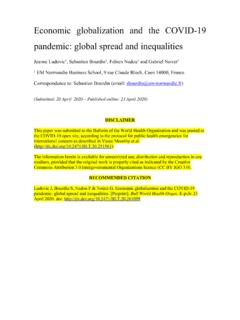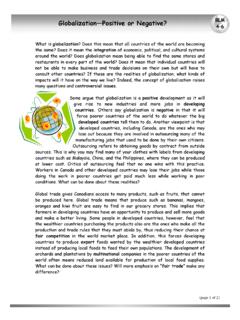Transcription of 8-Globalization and the Nation-State Sovereignty and State ...
1 US-China Education Review B 2 (2011), 243-250 Earlier title: US-China Education Review, ISSN 1548-6613 globalization and the Nation-State : Sovereignty and State Welfare in Jeopardy Agreement Lathi Jotia University of Botswana, Gaborone, Botswana This paper addresses the fact that although globalization cannot be resisted by the Nation-State , it is often confronted by mixed reactions from both the GN (Global North) and the GS (Global South). The essay charges that globalization has political, economic and cultural impact on the Nation-State , which ultimately impacts the issue of identity on global citizens . Finally, the paper argues that globalization also has an impact on the autonomy of the Nation-State especially on the education system and policies. Keywords: GS (Global-South), GN (Global-North), education, Nation-State , global citizen and globalization Introduction Economic, social, demographic and technological forces are dramatically altering relationships among nations as well as the nature of politics, public policy, administration, institutional relations within the nation-states (Jun & Wright, 1996, p.)
2 1). The wave of globalization is certainly not resistible although often confronted with a lot of mixed reactions, which to some degree reflects a lot of frustration and dissatisfaction, especially from the GS (Global South). One of the hair-splitting arguments pertaining to globalization is that it is seen as an economic monster whose objectives include, among others, the wiping away of the Nation-State s Sovereignty especially with regard to socio-economic and political autonomy. As a matter of fact, the Nation-State is seen as a toothless partner in the process and does not have the power or mandate to control or have a democratic voice pertaining to the principles and policies under which the globalization gospel is advanced. Contrarily, some schools of thought maintain that globalization has significantly progressed as an economic, social, technological and politically integrative process, because of the sound involvement of the Nation-State through the liberalization and rapid expansion of the markets as well as the harmonization of trade.
3 However, at the turn of the millennium, realities proved that a lot of poor countries had and continued to have choking debts, despite being on board of the globalization ship. So the debt forgiveness was the latest panacea for relieving poverty of poor countries (Easterly, 2002, p. 124). It is, therefore, the crippling of the poor nation-states economies, among others, which triggers a lot of questions about the legitimacy of globalization as a socio-economic and political messiah to the global village. The reality of the situation, however, was more different than these myths and fantasies propagated in glowing terms by the very forces that were responsible for global domination, exploitation, and mass enslavement through wage labor of the great majority of the world s population (Berberoglu, 2005, p. 1). Berberoglu further charged that globalization s focus was to liberalize markets, so that they could be easy accumulation of wealth by the world corporations at the expense Agreement Lathi Jotia, , Department of Languages and Social Sciences, University of Botswana.
4 globalization AND THE Nation-State : Sovereignty AND State WELFARE 244 of the rest of humanity which is sinking further into abject poverty and destitution. Now, the question is: What role does the nation-states play in this unbalanced globalization scale? At the tip of the tongue though, one wonders if the Nation-State has all it takes to put in place policies and modalities that would counter those that have been put in place by globalization for the sake of human development, as well as the betterment of the economies which are already flowing down the drain. Kamali (1998, p. 43) reflected that although the academy had been engaged in trying to understand and explain what globalization was and how everyone was adapting to it, the preponderance of the analysis was said to have missed focus on the effects that globalization may have on the well-being of the citizens in any given nation.
5 In view of this assertion, let it be noted, as per Kamali (1998, p. 43) that although discussions on globalization are often narrowed down to issues pertaining to the economy, globalization also embraces multifaceted factors, such as affective judgment, moral righteous, values, and a host of other socially and politically relevant variables. As such, within the process of globalization , the Nation-State has multiple tributaries to deal with, beyond the economic repercussions that may emerge as a result of the dynamics of the process itself. Burbules and Torres (2000, p. 14) asserted that globalization had some crucial characteristics which had major impact on the Nation-State . They categorized the factors in economic terms (where there is rise in internationalized advertising and consumption patterns; a reduction in barriers to the free flow of goods, workers and investments across national borders.)
6 And, correspondingly, new pressures on the roles of worker and consumer in society), political terms (whereby, there is a certain loss of Nation-State Sovereignty , or at least an erosion of national autonomy and correspondingly and weakening of the notion of the citizen as unified and unifying concept, which can be characterized by the precise roles, rights, obligations and status), and finally, cultural terms (where tension grows because of the manner in which globalization brings forth more standardization and cultural homogeneity, while also bringing more fragmentation through the rise of locally oriented movements). globalization of the Nation-State challenges the traditional view of national boundaries, and also challenges governments to develop global strategies to deal with growing array of intermistic political, economic, and cultural issues (Jun & Wright, 1996, p.
7 15). These socio-economic and political challenges of globalization ought to be addressed with a critical view point if at all change for the better is to suffice. globalization and the Nation-State : The Economic Perspective Economically, globalization has built a monopoly whereby the class capitalist society which is dominated by the transnational corporations in the GN (Global North) is taking precedence over everything, thus swaying in the GS into dire economic misery. The Seattle protests against the WTO (World Trade Organization) in 1999 are a clear indication of the animosity that the world has against the policies of globalization , which perpetrate poor conditions of the working class through out the world. The working class does not own the means of production and as so their input on policy is very much limited. Berberoglu (2005) argued: The term global corporation may be less misleading, but still makes one think of a corporation representing the interests of everyone on the globe, which is false.
8 Some economists are now using the more precise term, transnational corporations. The one viewpoint uniting all these corporations is the notion that the whole world is their oyster; that vast profits may be made by the control of markets in as many countries as possible. (p. 18) If then the transnational corporations which are solely based on the GN are the ones in charge of driving globalization AND THE Nation-State : Sovereignty AND State WELFARE 245the engine and turning the wheels of globalization , does not it, therefore, hold water that the Nation-State , especially in the GS, has a little saying more, so they do not have any bargaining power in as far as formulating the rules of the game. The playing field is rather rough and the Nation-State to some degree is compelled to be a sweet angel and adopt and implement global policies as they are or face the music by being sidelined by the corporate world giants.
9 The pro-globalists contend on the other hand that globalization has helped alleviate poverty and better the lives of people right around the globe. James (2001) as cited in Watson (2002, p. 12) posed that economically and liberal globalization had raised living standards throughout the world, because there were a fewer starving people today than during the 1960s. From another rational line, Pettifer (2001) as cited in Watson (2002) argued that the trickle down effect, which is the trickling down of wealth from the rich to the poor, is not working and has not produced any results to date. Further arguments sell the idea that even though economic globalization produces employment opportunities, the pays for the jobs are too low and the working conditions are purely hazardous to the lives of the workers. At the crux of the matter therefore is the argument that the Nation-State is put in a position of hopelessness, since it has no breathing mandate or space to push for the betterment of the working conditions for its people.
10 As so the Nation-State is just a passive passenger in the global malaise. One awkward global economic scenario is that although globalization preaches the liberalization of the markets for the benefit of all players within the game, the sad reality is that free trade still comes with some protectionist tendencies. Burbach (1992) as cited in Watson (2002) contended that free trade agreements such as NAFTA: Will enable US corporate capital to take advantage of the cheap labor resources to the south and better compete for the markets on a global level. The drive to NAFTA and the enterprise for the Americas is also a response to basic changes occurring within the Western hemisphere itself. Across the Americas, the boundaries of the nation State are being ruptured. (p. 19) NAFTA has been and continues to be at the center of the globalization controversy in that it is seen to be pushing for a borderless trade zone, whereas its policies are democratically deficient in that the GN s capitalist production takes away the people s control and their liberty to pave a path for their economic destinies.











